Modern Folk Liner Notes
Modern Folk Electronic Ensemble (by J Moss)

Modern Folk Electronic Ensemble initially came to me in a series of vivid dreams in late spring of 2022, unlike any other dreams I have had. I still remember what these dreams looked like three years later, and the images correspond to the song titles on the first half of the album. I saw a spirit cord/heard a spirit chord, an unearthly white, singing tube in a sea of darkness, connected to my stomach - my omphalus - and felt it drawing me from there into the great unknown/always known - the void point. I was suspended above the floor in a hallway, paralyzed, throbbing with electric oscillations, perceiving a vision of a floating loaf of bread, spot-lit in cold blue tones. I felt the presence of spirits, ghosts - people - from the past and the future and an awareness of my/our existence as an inseparable part of nature, as nature itself. I plowed through dark water like a torpedo, feeling the cool and infinite depth of it. I heard music in these dreams so I went to the Tascam 4-track to attempt to recreate it, using synthesizers and tape loops.
This music came to me in my sleep but I was obliged to realize it while I was awake, which caused me to reflect on the fact that there is no dream without waking, and no waking without the dream - "as above, so below," to borrow from the ancient pseudoscience of alchemy. "We live inside a dream," to quote David Lynch. I felt that there needed to be eight more songs, a sonic mirror, to represent being awake, living through the waking world with music, for a complete diurnal cycle. The broader world has felt increasingly frightening and disorienting to the average person in recent years. I was also a new parent at the time. My experiences with music were different, though no less enjoyable, ranging from blurred and flattened to emotionally heightened, blindsided at a weird moment. I would listen to something just once and not return or it would be over and over, sometimes attending to it deeply, sometimes only catching it in passing. I thought of the waking half of the album as diegetic music, like in film - if I was the character, this is what I was hearing; which also made it part of its own discrete reality, and subject to all the distortions my consciousness had to offer - a recreation of my experience of music. The song titles correspond directly to things I was doing or feeling - trying to do yoga or take care of the yard, hearing a beautiful pop song in a grocery store, watching reality TV, working late or regretting the feeling that I had to live through history - things so mundane that they appear at first glance to contrast with the dream world, but on an essential level were teaching me the same lessons. For these songs I used guitars presented both forwards and backwards, bass guitar and a drum machine. The waking world requires a rhythm section.
Primitive Future III (by Breanne Taylor)
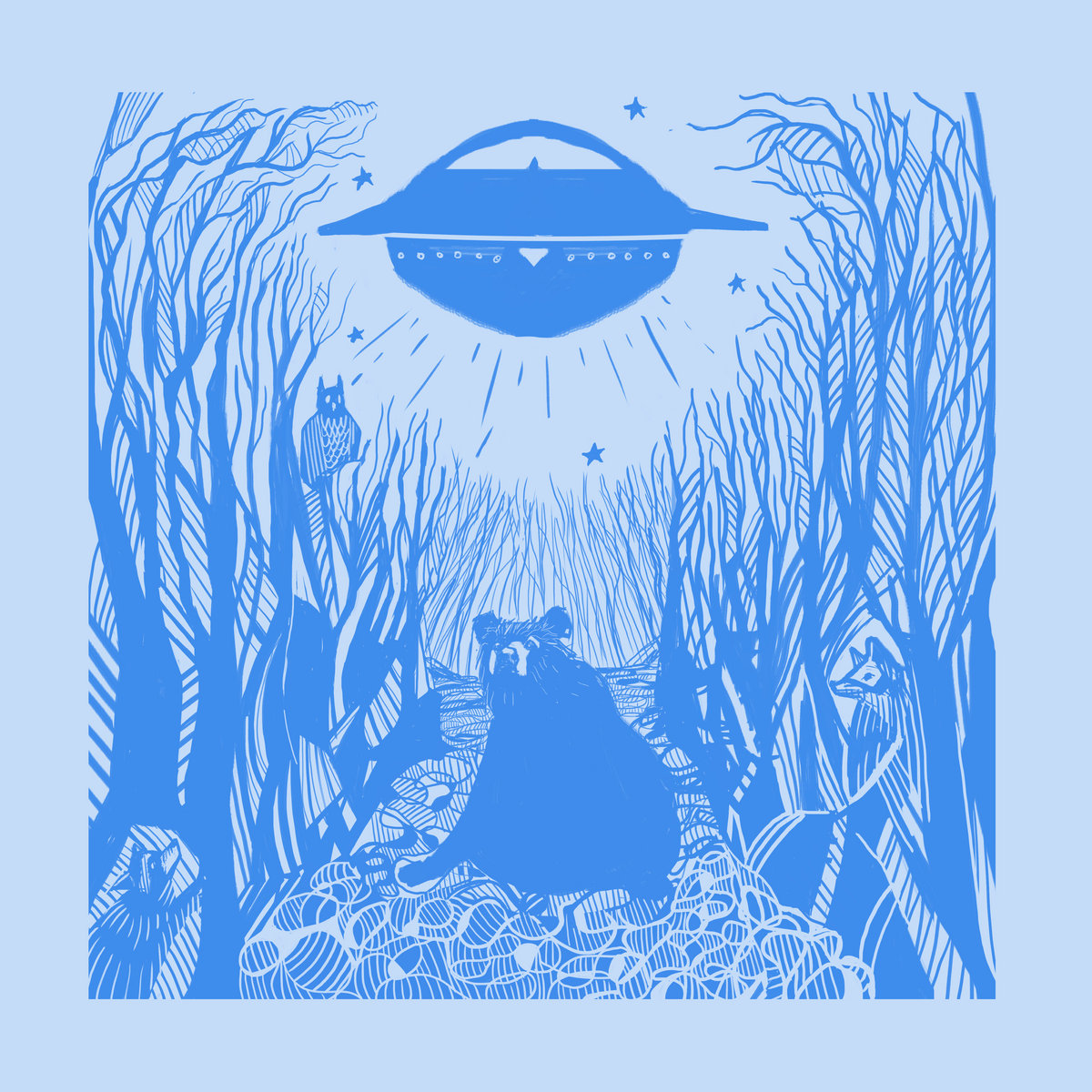
This album is not a departure for the Modern Folk, but the timely arrival into the extent of their well-honed and tediously crafted sound. Its rhythmic roundness feels like a coming of age for the group and an earthly homecoming. The remarkable album, recorded in 2023, marks 15 or so years of prolific DIY musical production on the part of multi-instrumentalist, J. Moss. In no way is it his starting point, but it’s the perfect part of his canon for the newfound listener - a memorable and evocative journey that draws from many wells of influence. The strides Moss has made in his distinctive songwriting and arrangement are on full display here, and he’d be the first to tell you about the seeds of influence that have been planted on his sound by known and outsider musicians alike - musicians and artists who Moss surrounds himself with in the here and now, at various haunts in Portland, Oregon and beyond, personalities past, and beings unknown.
The premise of the LP is simple enough, taking from its title, Primitive Future III a sort of sky-earth, today-tomorrow syllabus for tracks that range from the Link Wray Roadside Mechanic fuzz meets rain-stick-you-found-at-the-mall-in-1996 elements of “Human Heatwave Blues” to the blue nostalgia of “Dead Calm Current AM”. In weaving both salves for racing thoughts and total freakout soundscapes, the band, featuring Zach Barbery (bass, guitar), Austin Richards (guitar, shruti box, vox), Remi Lew (synthesizer, guitar, autoharp, vox), and Trevor Shorey (drums, percussion, vox) have delivered a few ways to itch your brain.
The first tracks on the album, including “Human Heatwave Blues,” could be interpreted as an initial meeting. The landing. This awakening in the dead of night is perhaps best captured in “Bear in the Huckleberries,” which has an unassuming elegance that’s packaged in a mechanical lullaby. Snug, beautiful, simple, and all wrapped up in a blanket of shruti calls. This one will protect us and them, it’s a message of good faith.
Moss’ fingerpicking stylings on “Braided Channels” evoke an entire day John Fahey spent on a lazy boy recliner. The song encapsulates the naturalness of the entire album; flowing calmy, letting the listener curl up in their hollow tree and dream about Spring. This hominess continues in the effervescent, “You’ll Have That,” featuring Jen Powers’ hammered dulcimer, which feels like a hazy reflection on grace.
On “Half a Moon,” we’ve ascended. The song is a standout. The plucky and gentle goodnight noises of the guitars ring through on this one. This track most aptly summarizes the themes of the album – foremost, the vast and miniscule distance between earth and space, our un/willingness as a species to look out and see others, and the peace in knowing you and I are just specs of dirt.
“Subdued,” unlike its title, sounds like the Primitive Future III crescendo, as it nods vehemently to the past. It is at once throwback and step forward for mankind. The track should be played while you gaze at a leaf and recognize the veins of your body.
The first time you hear Moss’ voice on Primitive Future III is on the masterful cover of “Nine Pound Hammer,” which brings us squarely back into orbit and reminds the listener that their feet will soon be firmly on the ground. The tune’s origin is traced to the work songs of Black sharecroppers and railroad workers in turn-of-the-century America. Blues legends Mississippi John Hurt and Taj Mahal are known for their versions. Here, the Modern Folk cover feels like a post-nuclear barn dance from hell. Of the times, always.
The real heart and guts of this distinctly human part of the album (the middle) is, “Baby Dollar”. It’s Chappell Roan’s ren faire and we just live in it. The song is modern, fresh, brilliant. No notes. Put it in an A24 period piece, right now. The score for a blustery cornfield embroidered on a pillow. Absolutely perfect.
Back on earth, “Brand New Canyon” is the Modern Folk’s homage to Zappa’s “Hot Rats” – keeping that species superiority alive because only a human could make somethin’ like this. It’s followed by “Ballad of Strange Gordon” which is hopeless music from a motel on the frontier. It’s gritty, windy, and long – the first 7 minute+ track on the album. A sorrowful, introspective soundtrack for when the journey is ending. The musical mound the band builds here creates a living space where little light gets in.
The landscape building carries on with “Hurt Bird,” a masterful sweet and sour bop. It’s ‘gloominess at sunset on the beach’ tone and tenor are reminiscent of XO-era Elliott Smith even though its production is nowhere near as muted or sweetsy as other tracks on the album.
Overall, Primitive Future III is a multifaceted tour de storm. It offers something for every listener – from the hushed lullaby instrumentals of the album’s beginnings to the structured song-set of the middle and the final drippy violin bow jams and fearful cry of the coda, “I Don’t Wanna be an Abductee”. The Modern Folk take us from initial landing to exploration and colonization and return us home. It’s music to guide us from the moon to the valley and on all paths in between. - Bre Taylor, Portland, Oregon
Primitive Future II (by Jason Woodbury)
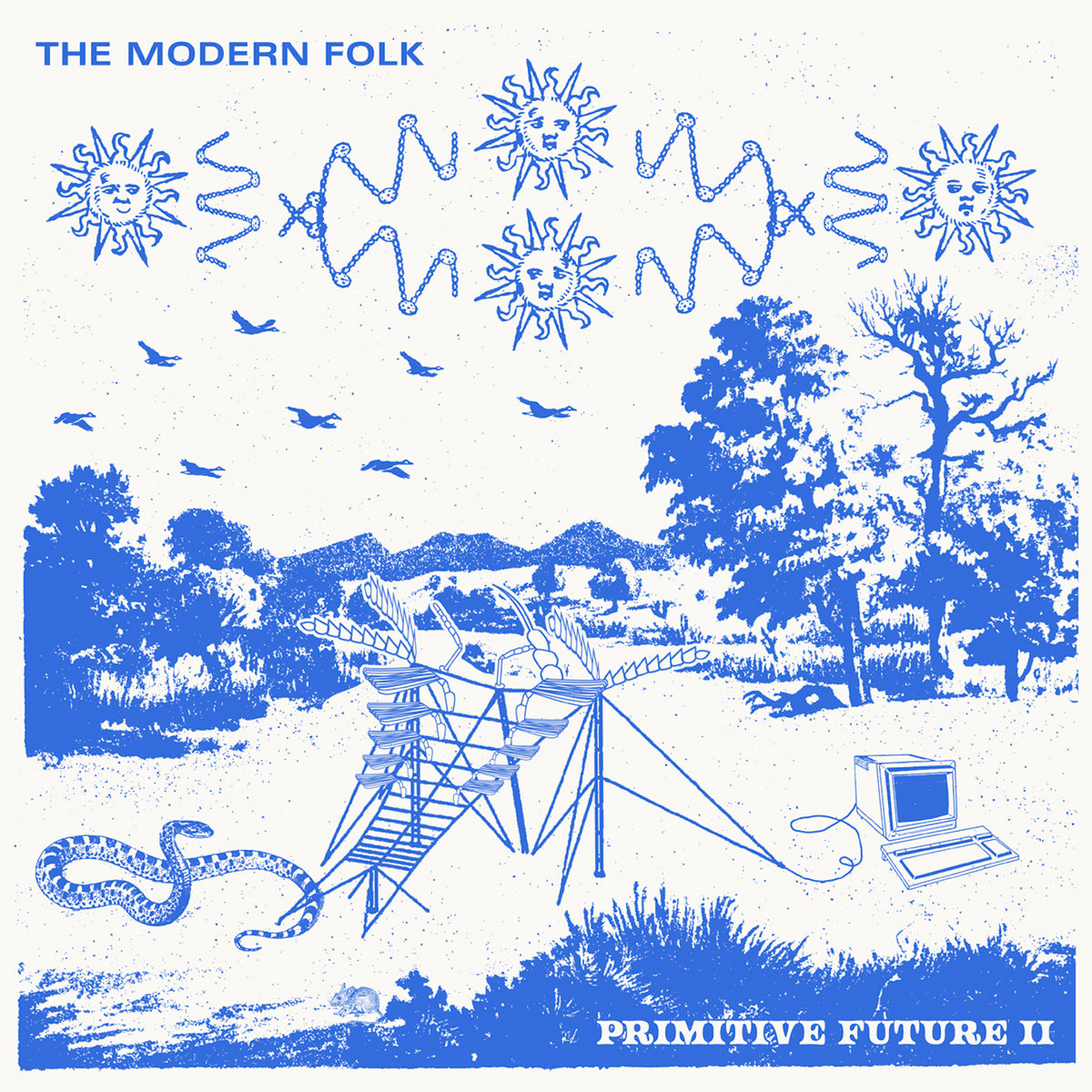
When J. Moss looks toward the future, he can’t help but glimpse something that looks more like the past. A William Blake quote from "Proverbs of Hell” rests in the liner notes of Primitive Future II, his latest album under The Modern Folk banner: “What is now proved was once only imagin’d.” Here, Moss lets loose his cosmic imagination, conjuring from dazed daydreams Music from the Big Blink, pastoral guitar soli and drifting electric surf ragas for a coming epoch in which old growth forests reclaim human developments, a big shudder shuts online all the way off, and unnamed creatures return to roam in plain view. There has always been a streak of absurdist humor to Moss’ work as The Modern Folk, which has since 2008 served as a repository for his field recordings, Tascam sketches, far out noise, and improvised jams. But as fresh new apocalyptic conditions continue to mount, it’s hard not to wonder if he’s on to something: Is it future or is it past? At what point does it become impossible to say?
Despite its sequel status—the album picks up where 2021’s Primitive Future/Lyran Group tape on Eiderdown Records left off—PFII provides a perfect jump on point for The Modern Folk’s discography. Like its predecessor, the album is halved: the A-side finds Moss evoking Takoma school acoustic reveries; the B-side features his Modern Folk Trio Band (Remi Lew, Austin Richards, and Zach Barbery) zonked out like the Ventures lost in space, peels of reverb drenched electric guitar drifting over tic-tac bass and hypno-rhythms. Drawing inspiration from John Fahey—whose folkloric tendencies and restless creativity encompassed everything from folk-blues to scarred earth noise—and favorite artists like Alex Chilton, Jerry Garcia, and Nina Simone, Moss prioritizes feel and raw expression over technical grace. Which isn’t to say that he isn’t a gifted guitarist, as evidenced by the lull of his gentle finger-picked odes to domesticity and fungi and the expansive interplay of the album’s second side.
Originally released on the The Modern Folk’s densely populated Bandcamp page, PFII has been re-sequenced and edited for vinyl release on Charlottesville, Virginia’s WarHen Records. The album is housed in a screen-printed jacket featuring art by Modern Folk alumni C. Foster-Baril, who adorns the cover and liner notes with esoteric images: suns smiling, burning candles, coiled snakes, a boxy old computer. One inscription reads: What would you play on guitar if the power went out and you knew it was never going to come back on? Another wonders what you would play “if everything lit up and you knew it was never going to go dim?”
When we conceive of other times, be they long gone or still to come, we are imagining. But not merely imagining. Moss understands this, and his riffy, dark comedy visions of what lies ahead (and behind) center on the multiple meanings implied by most all of the words we use to describe the world around us. What we call “modern” is an assemblage built from antique sources. What is called “primitive” could be just as easily understood as “elemental.” Largely operating outside of the music industry paradigm, Moss and The Modern Folk suggest another lane to be carved, one overgrown with huckleberry and crowded with mushrooms. In these songs there are spiritual lawns to be mowed, jokes to be retold until they land, hauntings and possessions by mysterious forces nonetheless at work in our desacralized age. To echo Blake once again: “The best wine is the oldest, the best water the newest.” The Modern Folk have returned with an overfilled Thirst Buster of each: drink up, good buddy. - Jason Woodbury, August 2021
Modern Folk One (by Jen Powers)
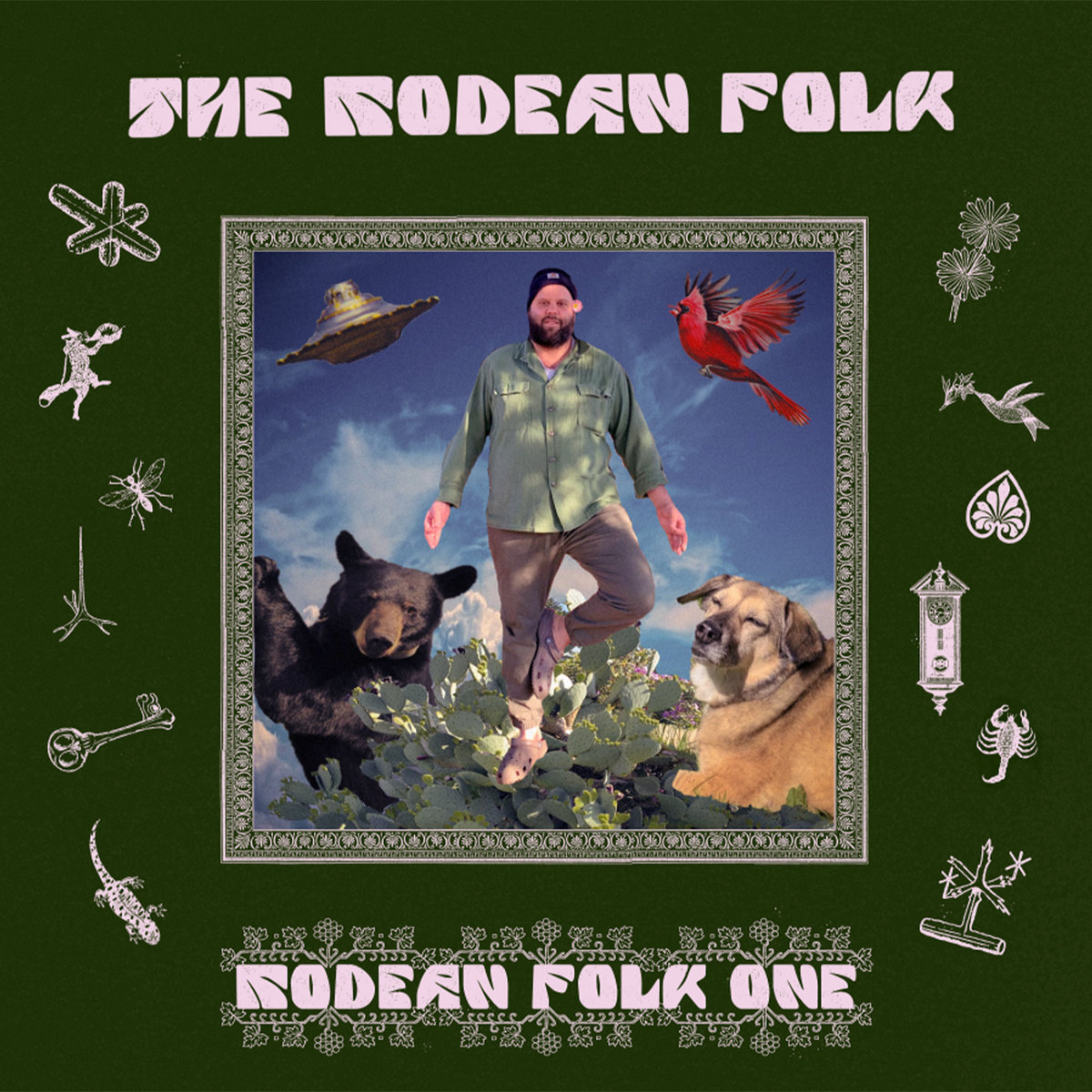
Modern Folk One is quite the apt title for this beautiful, sonic tidepool offering from Josh Moss. While it’s hardly the first album he’s released under The Modern Folk moniker, these four pieces are struck through with the same spirit of freshness that makes a daily occurrence like the sunrise so endlessly enchanting.
What makes perpetual miraculousness possible is simplicity, steady, gentle assurance, and the will to allow oneself to be astonished by the loveliness of the mundane. You awaken and turn to the window, you see the horizon the same way you’ve often seen it before, you stretch the muscles that have carried you your whole life, and you decide to take a walk down the street you’ve known for years, maybe decades, because there’s always something waiting to be witnessed along the path.
A patch of your neighbor’s grass has been squashed by a sleeping animal sometime in the night; the sun is catching the dogwood blooms at the corner in sweetly flaming bubbles of light; your best friend’s old house down the block has caught a new coat of vivid, shining paint, so effortlessly, nearly terrifyingly beguiling that you’re halfway home before you realize how many moments you’ve just relived by imagining yourself back inside those walls again.
And now, reentering your body as it is today, breathing the morning air as it is today, you can jot a few more lines in the Notebook of Common Miracles you keep handy in your mind. So many days feel just the same, and yet all of them are brand new.
“Modern Folk One” is a loving letter from father to daughter. Her heart beats strongly beneath the sheafs of melody and natural sounds that he wields, the wordless manipulations of instrumentation that fall onto each other in a meandering cycle, repetitively, satisfyingly, like the pages of a well-loved book as it’s returned to its place on the favored shelf. It is well-loved because it is familiar, reassuring, and yet it reads brilliantly differently every time. “Modern Folk One” is a loving and honest letter from father to daughter about the perpetual miraculousness of life. - Jen Powers, April 2022
Always Be Recording (by Joel Berk)
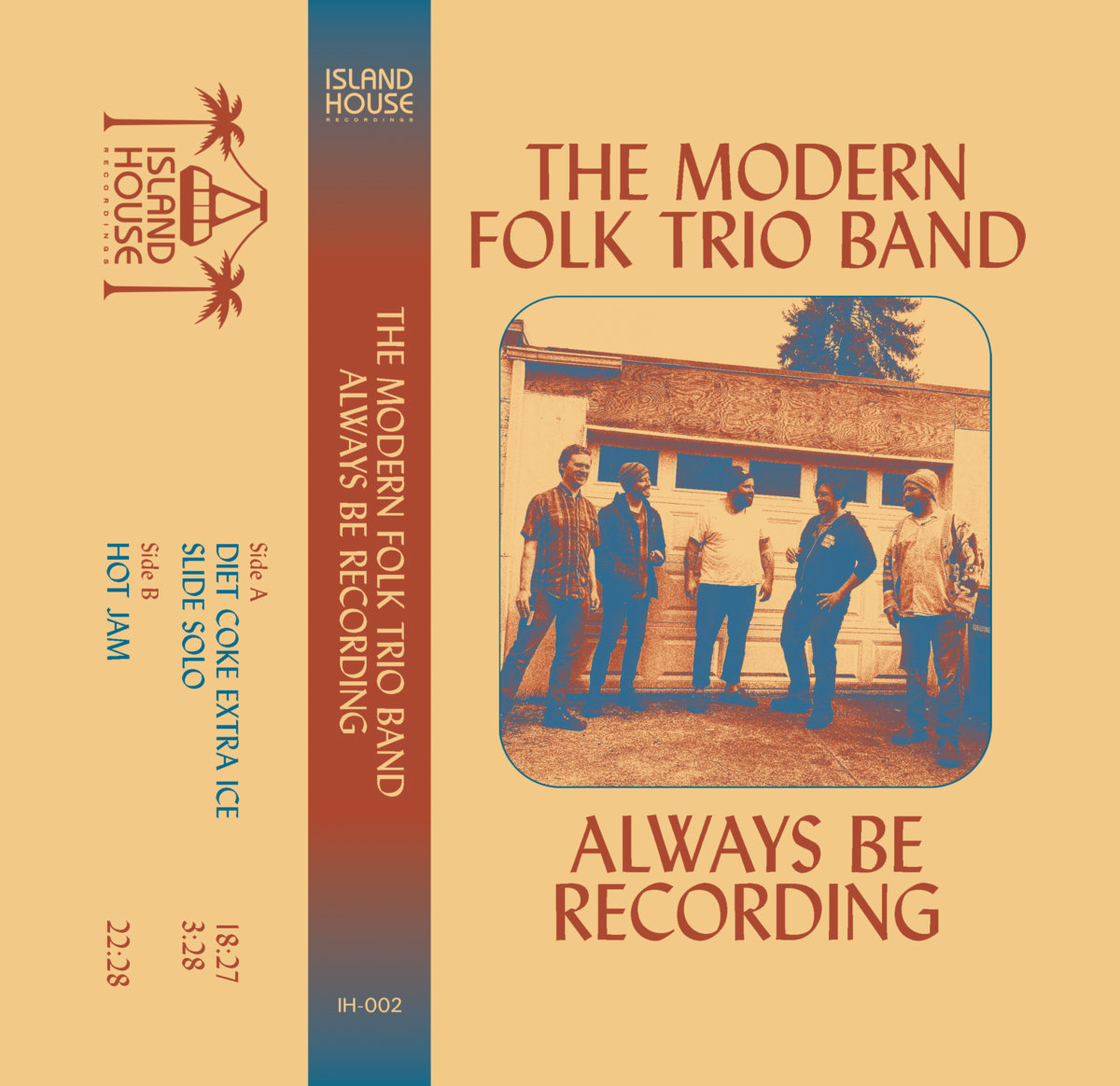 Always Be Recording could be considered the central mantra of J Moss’s entire The Modern Folk concept – at this point as much a way of life as a borderless musical collective. The Modern Folk, as an ethos, is all encompassing and strives to present folk music as a vibrant, living thing. What is “folk music” if not music made by folks? Anything is folk music. Everything is folk music. The Modern Folk.
Always Be Recording could be considered the central mantra of J Moss’s entire The Modern Folk concept – at this point as much a way of life as a borderless musical collective. The Modern Folk, as an ethos, is all encompassing and strives to present folk music as a vibrant, living thing. What is “folk music” if not music made by folks? Anything is folk music. Everything is folk music. The Modern Folk.
When you’re always documenting life, as Moss is, it’s surprisingly easy to forget about the mics and really lean in… which is exactly what The Modern Folk Trio Band, a quintet, does here. This is music for its own sake, in its purest raw form – direct from the collective subconscious to your skulls. Always Be Recording is what happens when a group of friends and listeners get together to instinctually make sound because that’s what they do.
Over the course of two longform excursions separated by a brief, contemplative solo piece, Moss & co dive right into the deep end. No beginnings, no middles, no ends, just two glimpses into zones that feel eternal. Two peeks into the infinite, which luckily for us were documented. Always Be Recording. - Joel Berk, June 2022
Always Be Recording II (by Blackwolf John Oates)
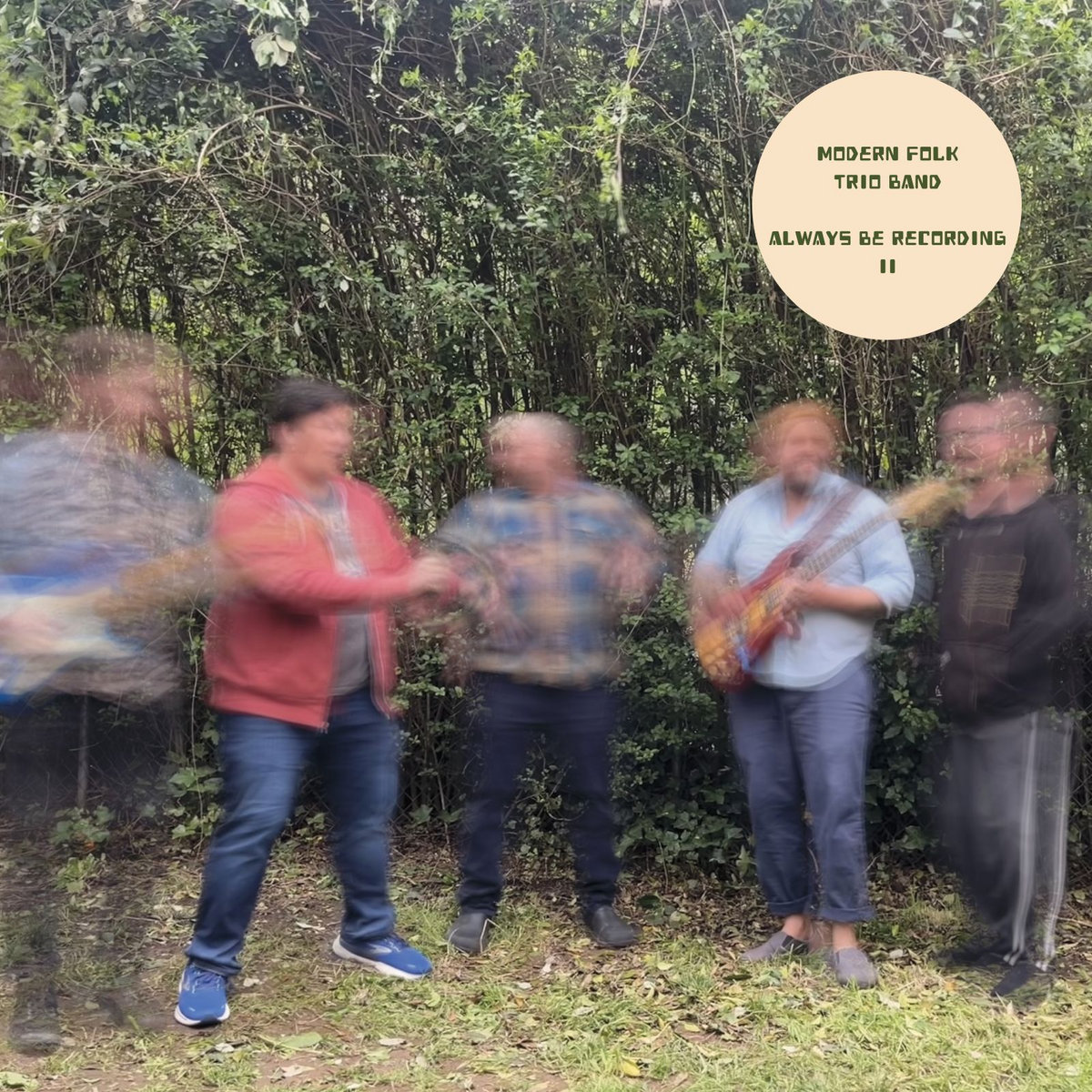 Far be it for me to tell you what to do with your time and money, but I think you made good with both when purchasing the disc you hold in your hands. I know I felt like I made good, with my time at least, when about 9 months ago, a poorly shot snippet of video came across my timeline of some band, a bunch of scraggly dudes with cool guitars jamming in someone’s living room, and I clicked on it. Simple, droney, guitar lines wrapping around each other, congealing with some unidentifiable “sound” I couldn’t put a finger on (Later identified as a Shruti Box...thanks Josh).
Far be it for me to tell you what to do with your time and money, but I think you made good with both when purchasing the disc you hold in your hands. I know I felt like I made good, with my time at least, when about 9 months ago, a poorly shot snippet of video came across my timeline of some band, a bunch of scraggly dudes with cool guitars jamming in someone’s living room, and I clicked on it. Simple, droney, guitar lines wrapping around each other, congealing with some unidentifiable “sound” I couldn’t put a finger on (Later identified as a Shruti Box...thanks Josh).
A few traded Tweets later I was on Bandcamp purchasing the first of many records of the band I now know as The Modern Folk (Trio Band, Homeland Band, Ragtime Band...Pick a name). I heard guitars bouncing off each other, synths providing texture, and a steady rhythmic pulse providing a grounding for whatever These Modern Folk had in mind. I like guitars, I like synths, I LIKE THIS (!!!), but what I like most is the spirit. The spirit of a band with the onions to call itself THE MODERN FOLK and put a fucking synthesizer or a shruti box on a record, because this is music for people who relish the simple pleasure of playing. Playing with friends, playing off each other, and playing for themselves or others.
So have a seat, drop this in your CD player, and join these MODERN FOLK as they play for themselves, play for you, and play for the hell of it. - Blackwolf John Oates
Modern Folk Electronic Ensemble 3 (by Mike Horn)

MFEE unfolds this ambient masterpiece as a captivating exploration of ethereal realms. As you immerse yourself in these soundscapes, ‘MFEE 3’ becomes a vessel that carries you through a trance, following the mesmerizing vision of dust that lingers in the air.
Once again, J. Moss delves deep into his bottomless sonic toolbox, crafting perhaps his most cohesive ambient record to date. 'MFEE 3' seamlessly blends star-shaped textures with just the right amount of noise and electronica, creating a melodious landscape inclusive of every Pantone color used sparingly. The Modern Folk Electronic Ensemble delivers a lucid dream, maintaining its enchanting grip from the opening notes to the ethereal closing echoes. Each track serves as a post-mortem reflection, contemplating past decisions made and embracing the subtle bliss of a clean slate for those yet to come.
As the inaugural release in the Island House Recordings digital series, 'MFEE 3' stands as a testament to the quality of releases in the Island House arsenal but also to a promising side of what’s on deck from J. Moss, who 'Always Be Recording.'
J. Moss takes us on a true listener's journey from the top, with standouts ranging from “more water,” which offers a cross between “Kid A” and a non-destructive disintegration loop, to tracks like “organ solo” acting as a mind-cleanser at the midway point. "chorus of urizen" maintains an ear-to-stereo energy to ensure you’re not missing the secret to a healthy life through spoken whispers, while “harsh cars” makes us ponder what a finished product of Jeff Buckley's 'Back in N.Y.C.' would have been from his posthumous album, “Sketches for My Sweetheart the Drunk.”
'MFEE 3' is an electronic excursion that defies expectations. Despite the year being in its infancy, this album is poised to linger in the soul of anyone who dares to explore, ultimately placing it on many best-of lists come the end of 2024. - Mike Horn
Serf Punk (by J.M. Hart)

Here, J presents The Modern Folk as a vehicle for what he describes as a “singer-songwriter album”. Intimately familiar with the format, I leapt at the chance to listen and was struck, once again, by the weight of J’s vision. No punches are pulled in these songs. No notes are wasted. Aside from three brief interlude tracks that serve as curtains to each of the album’s acts, and the ethereal saxophone/guitar duet, “Rural Street”, there are no extended ride-outs, freak-outs, or jams. This is not to say there isn’t lovely music here. Pedal steel, electric guitars, keyboards, saxophone, and fiddle deliver instrumental goodness adjoining the vivid truths in each song. Sonically, the songs set themselves apart, alternating between fingerpicked and strummed acoustic guitars or gone electric and either roiling with overdrive or grooving with a bit of twang. The album opens with a splash of electric guitar and a backbeat, deftly bent into an Appalachian holler that might have fit nicely on Beck’s “One Foot In The Grave”.
Wry lyrics abound, weaving tales of doom, resignation, and the practical conflicts of American life. “I’m Sick But I’m Working Anyhow” is crushingly real, plaintively expressing the workers’ plight with a lovely accompaniment. The album is called “Serf Punk” after all. Each tune shimmers with its own energy and wit but, taken as a whole, the album is a ride into a dark hollow of America that is inescapable even while everyone pretends not to notice. Most of us plain folk have a wheel or two in one of these ruts. With a little effort and some good tunes like these to fuel our hearts, we just might make it over the next ridge. - J.M. Hart